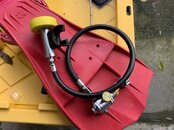Belzelbub
Contributor
Yep. My first set of gear was a package. It was mostly full of crap. Served me fine, I guess, for the first few dives, but as I was starting to dive more, it wasn’t long before I replaced everything.Avoid package deals at shops, like you would have avoided a wet-coughing toddler with a pendant length of green snot, traveling from his nose to his wrist and swaying, elastically, non-breaking, like a jump rope, during the height of the covidiocy.
Every example that I have seen has featured a weak link, whether p.o.s. regulators and octopuses; discontinued items (often with doubtful warranties), such as computers or BCs, etc. When I worked at shops as a kid, that was how extraneous crap was jettisoned -- operative word: crap. Run like hell from "silver," "gold," and "platinum" packages. Some friends who run shops, will freely admit the sleazy up-sell.
Splurging on regulators makes sense. To a point.I tend to disagree with those suggesting that regulators are not a primary concern and worth the cash. I would splurge on them; spend as much as you can -- name brands, who have a long history of support and avoid those with supposed "lifetime warranty" on parts, which are, nowadays, fraught with more legalese and are about as skeezy as timeshares in Del Boca Vista or "rolling land" real estate opportunities in Florida. I also know of people who have bought off-brands, usually as "great deals" from online sources, who have been unable to find any local servicing or parts.
There is absolutely no need to pay $1500 or more on a regulator. The difference is usually in materials. Everything else equal, a regulator made of brass will perform as well as one made of titanium. With a minor amount of care, there is unlikely to be a longevity difference either. Pay more for performance, not materials.
A better measure of longevity is in the brand, and the degree of commonality within that brand. Lots of different service kits within the brand can be a problem if the model is discontinued. My reg, and that of my oldest daughter have both been discontinued for several years. Hers has been discontinued for a while now. No problem, though as the brand uses one service kit for the majority of their line, so it’s unlikely that parts will become unavailable as long ast the brand is still in business.




